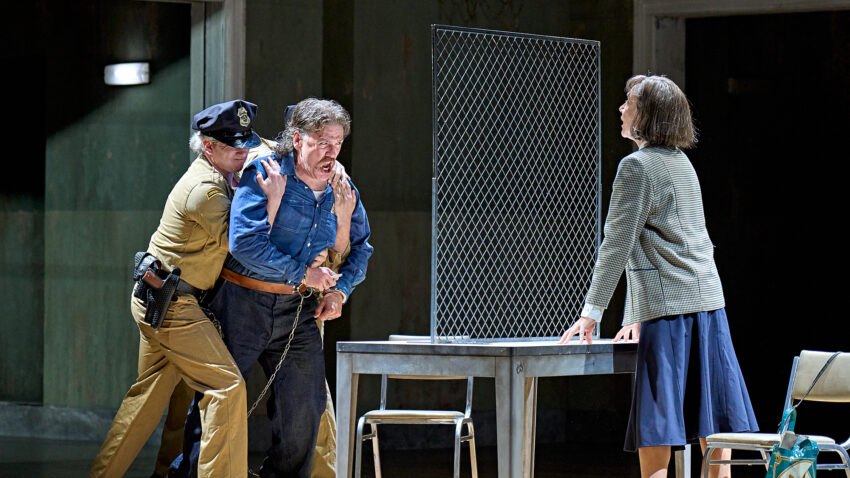Jake Heggie
Born in 1961, Jake Heggie began studying piano when he was seven years old, and writing music a few years later.
First and foremost a pianist in his early years, Heggie toured the country with his wife Johana Harris as a performing duo until 1989, where illness led to a switch in career. Working in public relations at San Francisco Opera, Heggie returned to composing as a pastime, using the contacts he made within the company to assist him in his pursuits.
Heggie’s beloved opera Dead Man Walking, premiered in 2000, is perhaps foremost in his compositional output, focussing on the story of Sister Helen Prejean, a nun who spiritually supports a convicted killer as he awaits execution on death row.
Other major works have included It’s a Wonderful Life, Moby-Dick, The End of the Affair and Three Decembers, all well received critically.

Philip Glass
Philip Glass is considered one of the most influential composers of the late 20th century.
Glass’s influence is largely due to the distinctive musical style he developed, which is often called minimalism.
Philip Glass Music and Where to Start
Glass had a number of influences which helped to shape his style of composing. He studied at the Julliard School, where he worked as an assistant to Ravi Shankar. This led to an interest in Indian music. He was among the first western composers to incorporate Asian influences into his compositions. He also studied with the eminent composition teacher Nadia Boulanger in Paris.
Following his studies, he started working in a wide range of fields including a number of operas, theatre collaborations, film scores – including Kundun, The Thin Blue Line and The Hours – as well as contemporary classical concert music, including over a dozen symphonies.
Amongst Glass’s most famous works are his trilogy of so-called ‘portrait’ operas Einstein on the Beach, Akhnaten and Satyagraha. Well into the 21st century Glass continues to be a globally successful composer, bringing large audiences to concert venues and opera houses alike.



George Gershwin
Arguably one of the most recognisable names on our list, George Gershwin has firmly secured his place in the American Composer hall of fame.
His popularity today is largely due to his most famous opera, Porgy and Bess, however he originally drew fame for his classical compositions, including Rhapsody in Blue and American in Paris.
Gershwin’s musical style is instantly recognisable thanks to the way he beautifully interweaves jazz into his operatic compositions. Although he is of Jewish and Russian descent, his works have a large African-American influence.
From incorporating the music genres from African-American communities (jazz, gospel and blues) into his work, to telling the stories of the people from these neighbourhoods.
Porgy and Bess was also one of the first operas to be performed by a cast of majority African-American singers, which was groundbreaking at that time of its first performance (1935).
His pioneering ideas have led to Gershwin still being beloved by audiences today, as well as his popular opera songs like ‘Summertime’ still being added to opera playlists everywhere thanks to a number of blues and jazz covers, as well as being performed on the likes of America’s Got Talent.



Erich Wolfgang Korngold
Korngold is an Austrian born American composer. Somewhat of a child prodigy, he took Vienna by storm, premiering his first ballet, The Snowman (Der Schneemann) when he was just 11 years old!
Following that was a series of successful works and notable operas. Arguably his most famous opera, The Dead City (Die tote Stadt), was composed when he was only 23. Still a favourite among audiences today, The Dead City is an exploration of love and loss and is an incredible insight into how people deal with grief.
Korngold then found himself in Hollywood after fleeing the rise of Nazism. Here he began his successful career writing scores for blockbuster films. Some of his film scores include, Captain Blood (1935), Anthony Adverse (1936) and The Adventures of Robin Hood (1938), all of which received Oscar nominations.

Jeanine Tesori
Everyone should get to know the name Jeanine Tesori because she is one of the most prevalent American composers of our time.
Primarily known for composing musicals like Thoroughly Modern Millie and an array of movie soundtracks, she has quickly acquired critical acclaim – receiving 5 Tony nominations.
In recent times, Tesori has begun branching out into the world of opera. However, there is one thing that ties all of her works together – they are deeply intertwined with American culture. From her musical stylings inspired by jazz and Motown, to her operas being a form of commentary on the social and political state of America. For example, her powerful opera Blue explores the themes of race, justice and inequality and how this can impact the internal politics of a typical African-American family.















